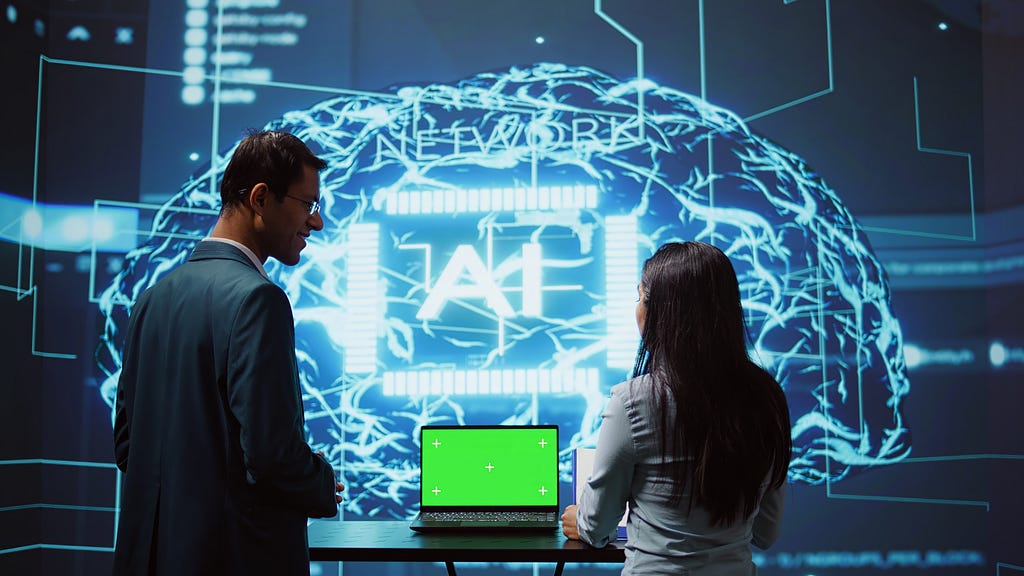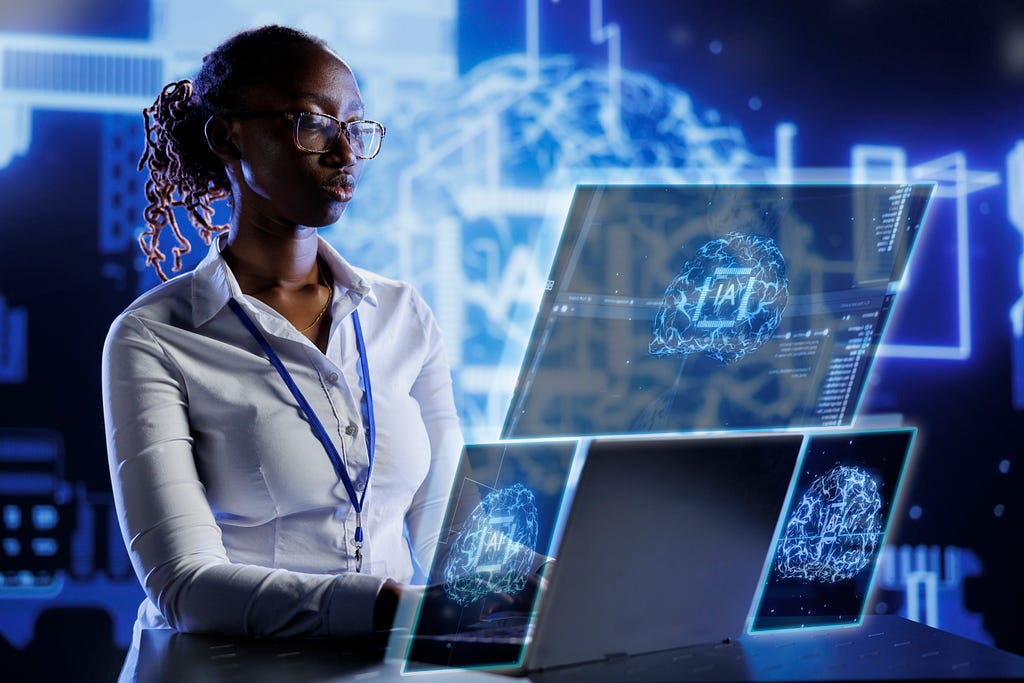Tokenize, Trade, Thrive in the New Digital Economy

Quantum computing and artificial intelligence( AI) are our most significant technological advancements. Quantum computing can execute complex computations at astonishing speeds, potentially revolutionizing various fields by addressing difficulties today beyond traditional computers’ grasp. On the other hand, AI propels through the examination of vast data, empowering it to make informed decisions and streamline tasks across various businesses.
Combining quantum computing with AI guarantees a leap forward in computational capabilities, permitting more advanced AI models and speedier processing times. This synergy is particularly alluring in decentralized systems, where distributed computing can use quantum improvements to boost effectiveness, security, and scalability.
DcentAI leads this merging, exploring the potential of decentralized quantum computing to fuel advanced AI applications.This article will tackle the connections between quantum computing and AI, their significance in decentralized systems, and their potential to inspire innovation and revolutionize various sectors.
Synergies Between Quantum Computing and AIHere’s how quantum computing and AI can be integrated:
Computational PowerOne of the most notable synergies between quantum computing and AI is the processing capacity that quantum machines can provide. Quantum computers may conduct operations exponentially faster than traditional computers because they use quantum bits (qubits), which can represent multiple states simultaneously. This vast computational power enables the speedy processing of massive datasets and complicated algorithms, which is critical for AI advancement. Tasks such as training deep learning models, which traditionally take significant time and resources, can accelerate innovation and development faster. DcentAI can integrate these advancements by utilizing quantum computing to optimize AI models, ensuring quicker and more efficient solutions across decentralized networks.
Enhanced AlgorithmsQuantum computing can also improve AI algorithms. Quantum techniques, such as quantum annealing and Grover’s search algorithm, can solve optimization problems faster than classical algorithms. This efficiency could lead to new AI algorithms capable of handling tasks such as pattern recognition, data grouping, and predictive modeling. By adding quantum principles, AI can improve accuracy, reduce mistake rates, and investigate previously unreachable solutions. DcentAI can use these enhanced algorithms to increase the performance of AI applications ranging from natural language processing to autonomous systems, ensuring that decentralized AI networks remain at the cutting edge of technological progress.
Applications in Quantum Computing
Here are some of the applications of quantum computing:
CryptographyQuantum computing’s potential in cryptography is one of its most promising applications. Traditional cryptographic methods rely on complex mathematical problems that are difficult for classical computers to solve. However, quantum computers can efficiently tackle these problems, rendering many current encryption techniques obsolete. It led to the development of quantum-resistant algorithms designed to protect data against quantum attacks. In decentralized networks, robust cryptography ensures data privacy and security. DcentAI can utilize quantum-enhanced cryptographic methods to safeguard sensitive information, maintaining the integrity and confidentiality of data across its decentralized platforms.
Complex Problem SolvingAnother important application for quantum computing is difficult problem-solving, particularly in disciplines requiring considerable data analysis and optimization. Quantum algorithms can find optimal solutions to problems in a fraction of the time that classical computers would. This capability especially benefits AI in logistics, drug discovery, and financial modeling. By integrating quantum computing, DcentAI can enhance its decentralized AI systems’ ability to solve intricate problems efficiently. It accelerates innovation and opens up new possibilities for tackling previously deemed too complex or computationally intensive challenges.
Challenges and Solutions of Quantum Computing and AIHere are some of the challenges and possible solutions of quantum computing and AI:
Technical Challenges- Challenge: Building and maintaining stable quantum hardware is a significant hurdle. Quantum bits, or qubits, are highly susceptible to errors due to environmental noise and other quantum phenomena.
- Solution: Advances in quantum error correction techniques and developing more robust qubit designs are essential. Collaborations between leading quantum hardware developers and decentralized AI networks like DcentAI can accelerate these advancements, leveraging a distributed approach to enhance the resilience and stability of quantum systems.
- Challenge: Scaling up quantum computers to handle significant, complex problems remains a technical challenge. Current quantum computers are in their infancy, with limited qubits and coherence times.
- Solution: Research into scalable quantum architectures and hybrid quantum-classical systems can address these limitations. DcentAI’s decentralized network can integrate quantum resources dynamically, using classical nodes to complement and support quantum computations, ensuring a scalable and practical approach to leveraging quantum power.
- Challenge: Integrating quantum computing with existing classical infrastructure poses compatibility issues. Ensuring smooth communication and data transfer between quantum and classical systems is complex.
- Solution: It is crucial to develop standardized protocols and interfaces for quantum-classical integration. DcentAI can facilitate this integration through its decentralized framework, enabling seamless interoperability and efficient utilization of quantum and classical resources in AI applications.
- Challenge: The excessive expenses of developing, maintaining, and accessing quantum computing resources prevent mainstream usage.
- Solution: Decentralized networks, such as DcentAI, can democratize access to quantum computing by spreading expenses and resources to a large user base. By pooling resources and allowing for collaborative use, DcentAI can make quantum computing more accessible and cost-effective for AI researchers and businesses.

Here are some of the real-world examples of quantum computing and AI
IBM Q Network and Hybrid AI ApplicationsIBM’s Q Network is a collaborative endeavor that combines top academic institutions, research labs, and industrial partners to enhance quantum computing. IBM Q Network’s integration of AI attempts to solve challenging problems that traditional computers cannot.
Applications:- Healthcare: Combining quantum computing and artificial intelligence to develop novel drug discovery strategies, such as modeling molecular interactions at the quantum level to predict the effectiveness of new compounds in treating diseases.
D-Wave Systems, known for its quantum annealing technology, has partnered with several AI research entities to explore the synergies between quantum computing and AI.
Applications:- Optimization Problems: Using quantum annealing to solve complex optimization problems in logistics and supply chain management. AI algorithms help define the optimization models, while quantum computing accelerates finding the optimal solutions.
Xanadu, a leader in photonic quantum computing, offers a quantum cloud platform called Strawberry Fields. This platform allows developers to build and run quantum algorithms integrated with AI models.
Applications:- Machine Learning: Enhancing machine learning models with quantum algorithms to improve their training efficiency and accuracy, for example, using quantum techniques to optimize neural networks in image recognition tasks.
- Cryptography: Developing quantum-resistant encryption methods that leverage both AI and quantum computing to secure decentralized networks against future quantum attacks.
Google AI Quantum explores the potential of quantum computing to enhance AI capabilities. It focuses on leveraging quantum supremacy to tackle problems currently intractable for classical computers.
Applications:- Natural Language Processing (NLP): Enhancing NLP models to understand better and generate human language. Quantum computing can improve the training of large language models, leading to more accurate and context-aware AI systems.
Integrating quantum computing and artificial intelligence with decentralized networks entails a technological frontier. Combining quantum computing’s novel processing capacity with AI’s solid analytical capabilities can address complex challenges across sectors more efficiently and effectively.
Decentralized networks, such as DcentAI, provide a strong foundation for allocating computational resources, encouraging collaboration, and improving security.As we navigate these connections, the potential for transformative advances in healthcare, finance, and environmental monitoring becomes more apparent. Accepting these developments will accelerate technical progress and pave the door for more robust, secure, and efficient solutions to some of the world’s most critical issues.
To learn more about DcentAI, visit our Facebook and X accounts.Become a pioneer of DcentAI community!Quantum Computing and AI: Exploring the Synergies and Future Prospects in Decentralized Networks was originally published in Coinmonks on Medium, where people are continuing the conversation by highlighting and responding to this story.
